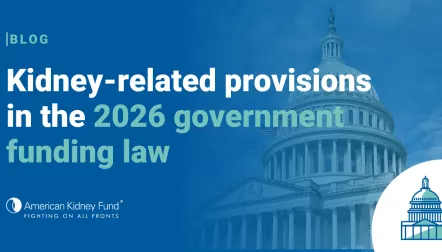
Blog post
Congressional Briefing wrap-up: Upstream Solutions to Chronic Kidney Disease

As part of our 2023 Kidney Action Week, AKF hosted a virtual Congressional briefing called Upstream Solutions to Chronic Kidney Disease: Diabetes and High Blood Pressure Prevention and Management to discuss the growing rate of chronic kidney disease (CKD) in the U.S. The number of people in the United States with CKD is growing, and we believe that the federal government must play a more prominent role in preventing and treating it before people end up with kidney failure, also known as End-Stage Renal Disease (ESRD). As the number of people with underlying chronic illnesses increases, the number of those with CKD and ESRD will rise. In the United States, the prevalence of end stage renal disease has climbed steadily in the last decade – increasing by 35 percent between 2010 and 2020. More than 800,000 people in our country are living with kidney failure, with the majority relying on dialysis to survive.
The goals of the briefing were to educate attendees about the state of kidney disease, provide recommendations for policymakers and inform ways they can prevent or manage the two most common underlying causes of kidney disease, diabetes and high blood pressure. AKF's President and CEO, LaVarne A. Burton, moderated our session and spoke with our panelists about their work and its implications for the future of kidney disease in the United States.
In a recorded message, Congressman Donald Payne from New Jersey discussed his journey as a diabetic kidney patient on dialysis and spoke about health disparities in the kidney community.
Our second speaker was Melissia Baker, American Kidney Fund Ambassador, kidney patient, and kidney education advocate. Melissia discussed her kidney disease diagnosis and how she was unaware that her Type 1 diabetes could affect her kidneys. She was diagnosed with kidney failure in 2005 and received her first kidney transplant in 2008, which changed her life. Unfortunately, in 2012, her kidney failed, and she went on at-home peritoneal dialysis, which led to other health issues. Melissia is currently undergoing in-center nocturnal hemodialysis and is searching for a living donor. She has volunteered with AKF for six years and advocated for laws to make things easier for kidney patients and their families.
The next speaker was Dr. Neha Pagidipati, cardiologist and associate professor at Duke University. Dr. Pagidipati told viewers "heart disease and kidney disease are inextricably linked. The same things that prevent kidney disease, prevent heart disease and vice versa. Fifty percent of patients with advanced kidney disease have cardiovascular disease." Dr. Pagidipati emphasized that heart disease and kidney disease have the same risk factors, such as diabetes, uncontrolled high blood pressure, obesity, smoking and a sedentary lifestyle. She stated that if we can treat and control these risk factors, especially diabetes and high blood pressure, we can reduce the number of patients with kidney disease.
Our fourth speaker, Kristy Anderson, director of federal government relations at the American Heart Association, discussed the Agriculture Improvement Act, more commonly known as the farm bill, which expires Sept. 30, 2023. Kristy discussed how the Supplemental Nutrition Assistance Program (SNAP), which is nutrition assistance for low-income households, accounts for 76% of the total cost of federal nutrition programs. Kristy explained that SNAP spending is projected to increase to 85% of the bill's total cost to assist low-income households, who typically have lower-quality eating patterns, which can contribute to cardiovascular disease.
Following Kristy Anderson was Dr. Deena Adimoolam, endocrinologist at Mount Sinai Hospital. Dr. Adimoolam discussed how diabetes is the leading cause of new kidney failure cases, accounting for 44% of them. She spoke about preventing kidney failure by controlling diabetes through affordable access to healthcare and education, especially in high-risk minority communities, and emphasized screening as the most crucial aspect of prevention and management. Dr. Adimoolam also emphasized the need to inform patients about the risk factors, including obesity, age, family history, and ethnic groups at higher risk, to help prevent diabetes and kidney disease. At the conclusion of her presentation, Dr. Adimoolam discussed how doctors can help prevent and manage these diseases by focusing on developing programs and interventions that help patients live a better lifestyle.
Our final speaker was Rob Goldsmith, director of advocacy and policy at the Endocrine Society. Rob highlighted the Special Diabetes Program, which is focused on the prevention, treatment and cure for Type 1 diabetes. He also spoke about the insulin cap of $35 in the Medicare program that was included in the Inflation Reduction Act and the Endocrine Society's continued advocacy for insulin affordability for people with private insurance and the uninsured.
During the Q&A portion of the briefing, our panelists discussed ways to get patients referred to specialists at an earlier stage. Dr. Pagidipati and Dr. Adimoolam agreed that primary care physicians should work with cardiologists, endocrinologists, and nephrologists as a team to get the best outcomes as possible for patients, primarily if a patient's diabetes or high blood pressure is not being controlled with medication and lifestyle changes. Kristy and Rob suggested that patient groups could best work together to advocate on policy issues by joining coalitions such as the National Alliance for Nutrition and Activity coalition led by the American Heart Association, which works on keeping SNAP robust and improving nutritional quality. Melissia ended the session advising patients on how she manages her health by staying in contact with her dialysis center nephrologist, primary care physician and transplant team, and her team of doctors being able to share information. Overall, this session highlighted the need to educate patients, doctors, and legislators on the links between diabetes, heart disease, and kidney disease and ways to manage and prevent these diseases.
If you missed the briefing or would like to watch the full session, you can watch it here.
[1] https://adr.usrds.org/2021/end-stage-renal-disease/1-incidence-prevalence-patient-characteristics-and-treatment-modalities





